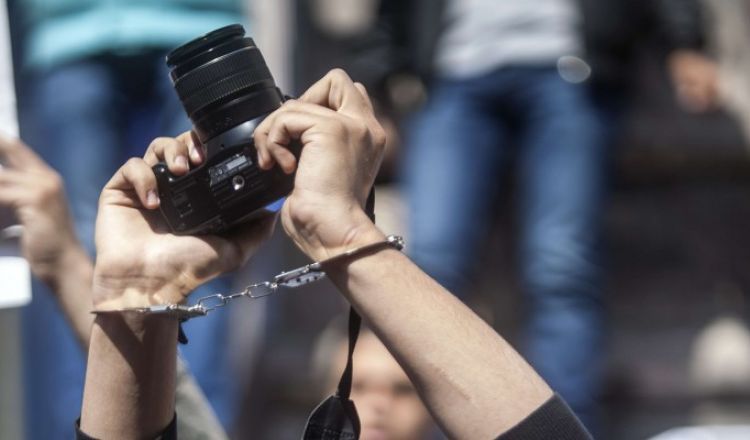JSC: Recommendations Following the Consultative Meeting “Palestinian Women Journalists Facing Challenges & Obstacles In & Out of Palestine"
2021-03-25 07:57

As the world celebrates International Women's Day 2021 “ChooseToChallenge”, Journalist Support Committee in Geneva (JSC) held a virtual consultative meeting under the title "Palestinian Women Journalists Facing Challenges and Obstacles inside and outside Palestine” via Zoom application, on Saturday March 20th, 2021 evening.
During the virtual consultative meeting, a group of selected Palestinian women journalists discussed the obstacles they face, how they could overcome others, and their demands of needed support, especially with the intense targeting of the Israeli occupation. They presented the incidents of violations of their rights in occupied Palestine and the absence of fair and equitable rights in the countries in which they work outside Palestine.
Journalists, Israa Al-Buhaisi (Gaza Strip-Palestine), Jihan Awad (Ramallah-Palestine), Rama Qudbashi (Damascus-Syria), Sana Hammoud (Saida-Lebanon), Sommoud Ghazal (Beirut, Lebanon), and Wafaa Behani (Beirut, Lebanon) were the main speakers in the consultative meeting, which concluded to the following recommendations to overcome the obstacles facing Palestinian women journalists and hindering them.
“JSC calls international journalism bodies to act as fast and efficient as possible to guarantee the journalists’, especially women’s, rights to protection and work in a safe environment, in which journalists could prosper, away from racism and any forms of discrimination:
- International organizations and all human rights and humanitarian institutions, foremost among which the International Federation of Journalists, should lobby for the commitment of Israeli occupation authorities to abide by international humanitarian law, especially the Third and Fourth Geneva Conventions of 1949, and other charters and treaties which clearly state that “journalists, media professionals and media institutions are considered civilian entities and attacking them in military operations is criminalized.
- The Palestinian security services should respect their obligations to protect journalists, ensure their safety, and prevent their prosecution, harassment or even detaining and arresting them for their journalistic activities, in accordance with the principles of international laws, foremost among which is Article 19 of the Universal Declaration of Human Rights.
- Palestinian Journalists syndicates, unions and federations ought to disregard any political affiliations and adhere to the code of ethics for journalists, to protect the right of all male and female media professionals to join the union and to achieve maximum benefit from the available opportunities, based on professional competence and merit, as well as to follow up the issues of all journalists with the competent authorities in cases of arrest or prosecution to protect the sacred right to freedom of speech and expression and the right to publish.
- International organizations concerned with refugee affairs are to follow up the affairs and issues of male and female media professionals in particular, to follow up the ratification of agreements and treaties necessary to secure the right of the Palestinian refugee to self-determination, field of study and specialization, and to fight against discrimination and racism.
- The International Federation of Journalists to take measures that guarantee the right of Palestinian media workers and journalists who have sought refuge outside occupied Palestine to practice journalism.
- The authorities of the countries hosting Palestinian refugees to respect their civil rights and endeavor to provide as much support as possible to male and female journalists among the Palestinian refugees on their lands to practice the profession of journalism and media.
- International organizations and the media to intensify tolerance programs and communication between refugees and hosting countries, to reject any racial prejudices which could lead to hate speech criminalized and prohibited by international forums.
- International organizations and governmental agencies to provide the necessary psychological support to all journalists, especially Palestinians, to help them overcome the psychological trauma they experience while covering the traumatic news and what they entail.
For the Arabic Version, Click here.
لجنة دعم الصحفيين: لقاء تشاوري افتراضي تحت عنوان "اعلاميات فلسطينيات يواجهن التحديات والعقبات داخل فلسطين وخارجها "لجنة دعم الصحفيين: لقاء تشاوري افتراضي تحت عنوان "اعلاميات فلسطينيات يواجهن التحديات والعقبات داخل فلسطين وخارجها "
Posted by Journalist Support Committee - JSC on Saturday, March 20, 2021









